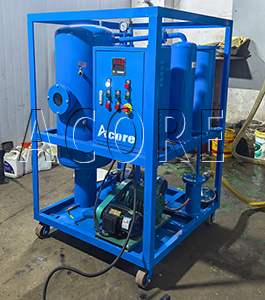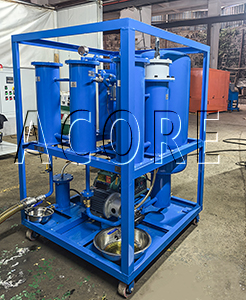- Double Stages High Vacuum Transformer Oil Purifier
- Vacuum Transformer Oil Purification Machine Mounted On Mobile Trailer
- Lube (Turbine/Hydraulic) Oil Purifier
- Single Stage Vacuum Transformer Oil Purifier
- Vacuum Dehydration Oil Purification System
- Insulating Oil Purifier
- Portable Oil Filter Machine
- Coalescing Type Oil Purifier
- Disc-type Centrifugal Oil Separator
- Diesel (Fuel) Oil Filtration System
- Oil Filter Press Machine
- Vacuum Pump Unit
- Air Drying Purification System
- Testing Equipments
- SF6 Gas Treatment Plant
- Accessories: oil filters, vacuum/roots pump, filtering tanks, oil pump, oil blender,etc
Acore Filtration Co. Ltd.
- Tel : +86 132 06063693
- Email : sales@acorefiltration.com
- Mobile & Whatsapp : +8613206063693
- Fax : +86 23 8132 4618
- Add : No.2, Jianhe Road, Banan District, Chongqing, China
Case
VHF20(1200LPH) Hydraulic Oil Purifier Sales to Mexico
November 25,2025.
In industrial production, hydraulic systems
are the core components of many mechanical devices, and their normal operation
relies on high-quality hydraulic oil. The cleanliness of hydraulic oil directly
affects the efficiency, lifespan, and reliability of the hydraulic system.
Therefore, choosing the Hydraulic Oil Purifier is crucial to ensuring the
stable operation of the hydraulic system. This article provides a comprehensive
selection guide from aspects such as filtration precision and processing
capacity, helping you choose the right equipment and ensuring it is perfectly
matched with your hydraulic system.
1. Filtration Precision: Ensuring the Cleanliness of Hydraulic Oil
Filtration precision is one of the core indicators of a hydraulic oil purifier,
as it directly determines the size of impurity particles that the purifier can
remove. Precision components in the hydraulic system, such as hydraulic pumps,
valves, and cylinders, have very high requirements for the cleanliness of
hydraulic oil. If the hydraulic oil contains too many impurities, it may cause
increased wear on these components, or even lead to failures, affecting the
overall efficiency and lifespan of the system.
When selecting a Hydraulic Oil Filtration Machine, the filtration precision
should be determined based on the specific requirements of the hydraulic
system. In general, the higher the working pressure of the hydraulic system,
the stricter the cleanliness requirements for the hydraulic oil, and correspondingly,
the higher the filtration precision needed. For example, for high-pressure
hydraulic systems, it may be necessary to choose a purifier with a filtration
precision of 3μm or higher to ensure that the hydraulic oil is free of larger
impurity particles, thereby protecting precision components in the system. For
some low-pressure hydraulic systems, the filtration precision can be slightly
lower but should still meet the basic cleanliness requirements of the system.
2. Handling Capacity: Meeting the Flow
Requirements of the Hydraulic System
Handling capacity refers to the amount of hydraulic oil that the Hydraulic oil Filtration
Machine can process within a unit of time, usually measured in liters per
minute (L/min) or liters per hour (L/h). The flow rate of the hydraulic system
determines the required handling capacity of the oil filter. If the capacity of
Hydraulic Oil Purifier is too low and cannot meet the flow requirements of the
hydraulic system, it may result in poor circulation of the hydraulic oil and
affect the normal operation of the system. Conversely, if the handling capacity
is too high, it may lead to waste of equipment and energy.
When selecting a model, VHF Hydraulic Oil Filter Machine should be chosen based
on the actual flow rate of the hydraulic system. Generally, the handling
capacity of the Hydraulic Oil Filter Machine should be slightly higher than the
maximum flow rate of the hydraulic system to ensure that the hydraulic oil can
be sufficiently filtered and circulated during system operation. It is also
necessary to consider the operating conditions of the hydraulic system, such as
whether continuous operation is required and if there are flow fluctuations.
For hydraulic systems that need continuous operation, an Hydraulic Oil
Filtration Machine with stable and reliable handling capacity should be
selected; for systems with significant flow fluctuations, a filter with a wide
handling capacity range should be chosen to accommodate different operating
conditions.
3. Equipment Compatibility: Seamless Integration with the Hydraulic System
In addition to filtration accuracy and handling capacity, the compatibility of
the Hydraulic Oil Purifier with the hydraulic system is a key factor in
selection. The connection method, installation size, and working pressure of
the filter must match those of the hydraulic system to achieve seamless
integration and stable operation.
In terms of connection methods, Hydraulic Oil Filter Machine are generally
available with pipeline or flange connections. The appropriate connection type
should be chosen based on the layout of the hydraulic system's pipelines and
interface types to ensure the oil purifier can be easily integrated into the
system. Regarding installation size, the installation space of the hydraulic
system should be measured in advance to select an appropriately sized filter elements,
avoiding installation difficulties due to insufficient space. Additionally, the
working pressure of the hydraulic oil purifier should match that of the
hydraulic system to ensure operation within a safe pressure range, preventing
adverse effects on filtration performance and equipment life due to excessively
high or low pressure.
4. Other Considerations
Besides the key indicators mentioned above, other factors can also affect the
selection of a hydraulic oil filter machine, such as the filtration materials
and the service life of the filter element. High-quality filtration materials
provide better filtration performance and longer service life, reducing the
frequency of filter replacements and lowering maintenance costs. Furthermore,
the degree of automation and monitoring functions of the filter are also worth
attention. Hydraulic Oil Purifier with automated control and real-time
monitoring can facilitate easier operation and management, promptly identifying
and addressing issues during the filtration process and improving system
efficiency and reliability.
5. Conclusion
Choosing the right hydraulic oil filtration machine is crucial for ensuring the stable operation of the hydraulic system and extending equipment lifespan. During the selection process, considerations should include filtration accuracy, handling capacity, equipment compatibility, and other related factors. Filters should be selected according to the specific needs of the hydraulic system to ensure reliable performance and economic suitability.











 +8613206063693
+8613206063693 Rufus Huang
Rufus Huang sales@acorefiltration.com
sales@acorefiltration.com +8613206063693
+8613206063693 +86 23 8132 4618
+86 23 8132 4618